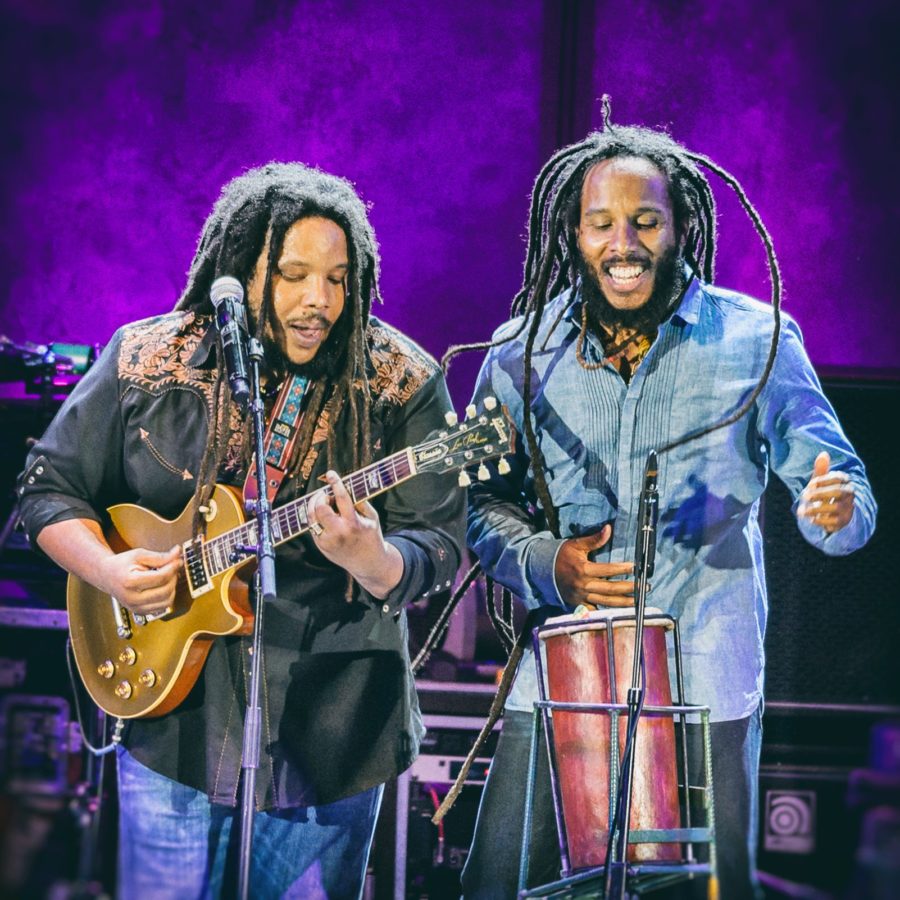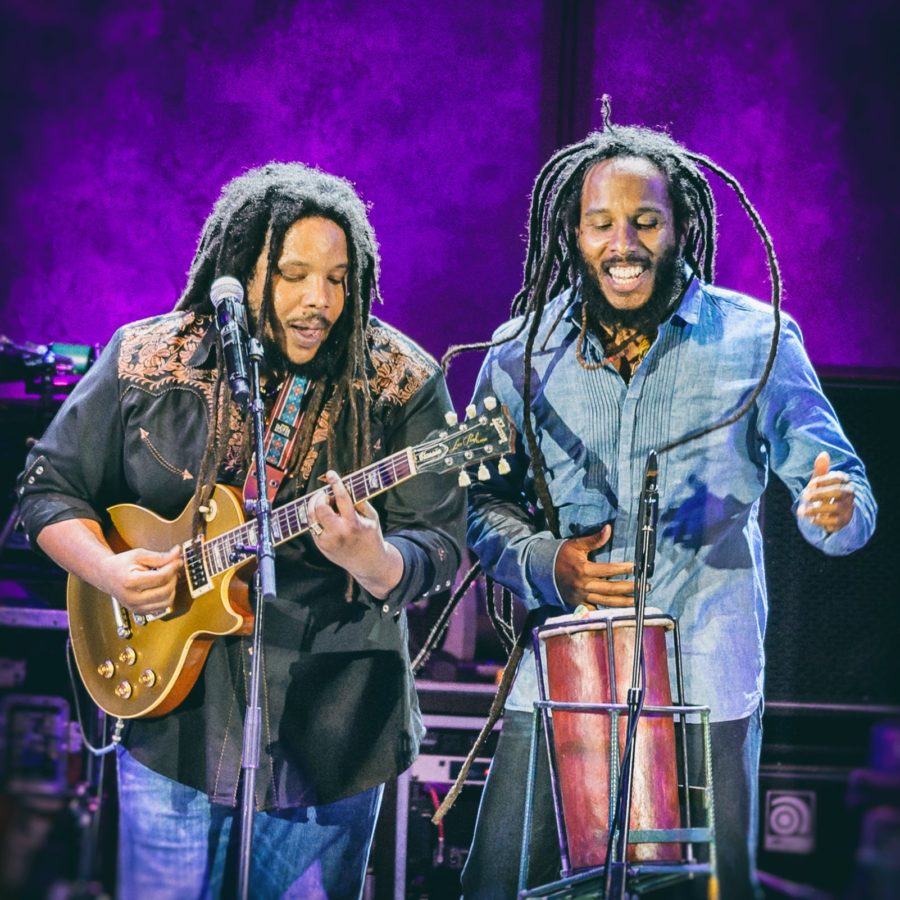A message from a Marley
BeachLife Festival is postponed. But Ziggy Marley, who was scheduled to appear with his brother Stephen in honor of Bob Marley’s 75th birthday, says this moment offers a larger lesson in human connection

Stephen and Ziggy Marley, who were slated to perform at BeachLife Festival in May in honor of their father’s 75th birthday. Photo courtesy BeachLife
Ziggy Marley was scheduled to perform at BeachLife Festival in Redondo Beach in May, as part of an international tour celebrating his late father Bob Marley, who would have turned 75 this year and who, nearly 40 years after his death, remains one of the most influential storytellers of our age.
The festival was postponed last week amid concerns that large gatherings facilitate the spread of the novel coronavirus. But Ziggy, who festival organizers hope will be on the bill when BeachLife finally does occur, still honored a scheduled interview last week.
A larger message flows through his music, as through his father’s. Throughout our conversation, the 50-year-old father of seven offered words of profoundly simple, strikingly relevant wisdom shaped by faith in God and in love, which for him are one and the same. In keeping with his father’s tradition, he has made it his life’s work to throw spiritual anchors into a turbulent world.
“We have to roll with every punch,” Ziggy said of the current state of affairs. “This life gives us ups and downs. This is a down. So we just have to get through the downs and get back up. I mean, this is just a part of life. For a society like, say, America, that has never experienced something like this before — because other countries, where we come from, we have a lot of turmoil, we got a lot of downs, generally speaking, and so we’ve been through things — but for those who have never been through something like this before it’s kind of, you gotta have the attitude that what will be will be. But you gotta do your best – you gotta do whatever you can – to make it be as positive as you can because certain things you have no power over, but what you have power over is your own way of thinking. It’s difficult, but it’s mental and the mental part is one of the biggest parts. What’s your mindset? Keep a positive mindset, mon. Humans have been through much worse than this before. People go through much worse than this right now, every day.”
Filtered through the lens of his philosophy, this is not a callous dismissal of any particular strain of suffering but a reminder that sometimes, perspective is all we have. Ziggy belongs to a musical lineage that sprouted from the shantytowns of Jamaica. Reggae itself was born of people who had suffered through the sickness of injustice and emerged with no illusions about humanity or equality or progress.
“So much trouble in the world,” Bob Marley sang in 1979 with his band, The Wailers, named for those who wailed under the weight of the ghetto. Like his father, Ziggy has spent much of his life contemplating oppression. And, also like his father, who sang that we’ve got to face the day (oo-wee), come what may, Ziggy finds hope in the liberating power of perspective.
Throughout the ages, the great spiritual teachers have taught that whether you’re in the storm or in the eye of the storm is a matter of choice, regardless of the intensity of your storm. Jesus of Nazareth told his disciples not to let their hearts be troubled, but instead to trust God. Renowned Buddhist monk Thich Nhat Hanh said seeds of peace grow when they’re fed, as do seeds of fear. Muhammed told his followers to find rest in their hearts by remembering God.Asked whether he gets discouraged in his fight against what his father termed mental slavery, Ziggy said: “No, check it – that’s the plan, though. The plan is to discourage us. The plan is to demoralize us. This is where the fight is: it’s in our minds. … That is where the trouble is: to discourage those of us who have a better vision. … When you know the tactics of the other side, you go, that’s their tactic, okay, I get you, it’s not gonna work on me because I realize your tactics. Your tactic is to discourage me, it’s to let me feel hopeless, it’s to let me feel that I can’t do anything, it’s to let me feel that no matter what we do, nothing will change. That is a tactic, but we realize that. We gonna push through, no matter what.”
He’s not immune to the sting of what he calls the tactic. His father was singing about the trouble in the world nearly 60 years ago; the battle often feels long and uphill. Ziggy admitted he gets discouraged.
“Discouraged and also angered at times,” he said. “All emotions – all human emotions, we go through them, it’s natural. But the important thing is to not stay in that discouragement. To experience it, but not let it linger on forever. It’s human. We’re human. It’s a human emotion, but to rise above – that is what is the most important thing. … We experience the sorrow but we also experience the coming out of it, which is even more powerful than the discouragement itself.”
He locates hope in knowing “there is a power that is working that is beyond the power of man.”
“That power is true love,” he said. “And we know that if we can spread love more, we are more than sure of the benefits that we as human beings will get from just being more loving with each other. There is no doubt that love is better than anything else that’s going on. We have no doubts about that. … So it’s like the hope is in the thought that we know what love is and we know what love can do if we get love to the people … Now, we’re not talking about a fantasy of everything’s hunky dory but what we’re talking about is a rebalancing … where instead of the negative being so powerful the positive becomes powerful and the negative becomes the exception to the rule. The rule becomes love and every now and again, you have some asshole doing some shit and you be like, alright, that’s the exception. That’s not the rule.”
The work that Ziggy does in the world – his music, the charities he runs to empower youth in Africa and Jamaica, a cookbook and business that promote organic eating – aligns with this rule. His foundation, U.R.G.E., meets material needs for food and clothing, but more than that, it strives to give resources that can never diminish: compassion, enlightenment, love.
The world he wants to leave behind for his children and their children is a world in which people recognize their shared humanity, a world with “less racism, less hate, less people … who don’t have compassion for other people,” he said. The current COVID-19 pandemic is a negative articulation of our connectedness, but the lesson it teaches has the potential to be enduringly positive.
“What this thing shows us is that we’re all connected,” he said. “Do we know that now? Can we realize that now — that what happens to one human being affects us? Can we realize at this moment in time that this is a lesson to learn, that if we understand that we’re connected we can live a better life on this planet? This is one of the lessons of this situation — it’s that something can happen to someone one thousand, one million miles away and we can be affected because we’re human beings and we’re all connected. How we treat each other, how we care about somebody we don’t even know, is just as important as how we care for somebody that we do know. This is the lesson of this thing: the connection of humanity.”


